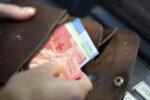 Trying to restore a system that is spiraling away from equilibrium with new extremes of obsolete, misguided policies only accelerates the swings from apparent stability to cascading chaos.
Trying to restore a system that is spiraling away from equilibrium with new extremes of obsolete, misguided policies only accelerates the swings from apparent stability to cascading chaos.
The conventional view of the market is there are two sides to every trade and one is right and the other is wrong.The punters who correctly read the tea leaves and who were right scored gains on their trade and those punters whose forecast was wrong lost their bet.
But what if this market isn’t binary, but rather a crushing machine that pulverizes every forecast and position in a disorderly process in which every forecast/position is crushed to rubble and then the market moves on to another forecast/position and crushes that, and so on until every forecast/position has been pulverized and every once-confident pundit / manager has seen their core positions blown to pieces.
In other words, what if everyone is right just long enough to become confident in their charts, correlations, research, etc. and wrong just long enough to blow up their accounts?
How could a relatively tame binary market of Bulls and Bears become a monster that chews through everyone’s accounts? Here’s the dynamic behind such perverse swings and extremes:
As the financial system and global economy veer further away from equilibrium, central banks and governments respond by pushing reactive policies to new extremes. These unprecedented extremes appear to stabilize a tumbling-into-chaos order just long enough to restore everyone’s confidence in the system’s ability to claw its way back to equilibrium, but this restoration of stability came at a high price: every policy extreme unleashes an equally extreme destabilizing dynamic.
For example, to restore confidence in a failing currency, a central bank jacks up its Treasury yields, pulling in capital attracted by the high yields. But this rapid increase in interest rates spins the domestic economy into a self-reinforcing recession. The central bank panics and slashes yields, which then pushes the currency off a cliff, undermining the domestic economy rather than “saving” it with lower interest rates.
A funny thing happens on the way to re-stabilizing markets with extreme policies: second-order effects, perverse incentives and unintended consequences pile up, destabilizing whatever had just been “saved” by extreme policies.
(First order effects: every action has a consequence. Second order effects: every consequence has its own consequence.)
The financial media’s focus is solely on first-order consequences: central banks intervened in the currency, bond and stock markets, yay, everything’s fixed. (Ahem: Everything’s Fixed–Except What’s Broken)
In this scenario, everyone will be wrong just long enough to blow up their account: everyone forecasting, inflation, deflation, stagflation, super-duper rally, panic-driven crash, dollar collapse, dollar rise, gold-backed yuan, commodity super-cycle, you name it–all of these will look hopeful / look right long enough to sink the hook in true believers, who will then cling to their forecast/position even as the rollercoaster become less predictable and throws more punters off the ride.
Those trying to trade the whipsaws blow up their accounts one whipsaw at a time. I only lost 4% on each trade multiplied by 20 losing trades still results in a blown account.
In surveying the wreckage left by everyone being just right enough and just wrong enough to blow up their account, we’ll think: but I was so close to being right! Exactly. We’ll all be right enough just long enough to trust our system, analysis, hedge, strategy, etc., and wrong just long enough to lose our capital and confidence. Too late, we’ll be right again–or sorta-kinda right: if only we’d bet big on the yen / bat-guano pair and hedged with the quatloo / wheat-futures thingy, we would have been golden.
Trying to restore a system that is spiraling away from equilibrium with new extremes of obsolete, misguided policies only accelerates the swings from apparent stability to cascading chaos.Eventually, even the semblance or stability cannot be restored, and we’ll have to deal with the real economy without financialization trickery.
Full story here Are you the author? Previous post See more for Next post
Tags: Featured,newsletter



















